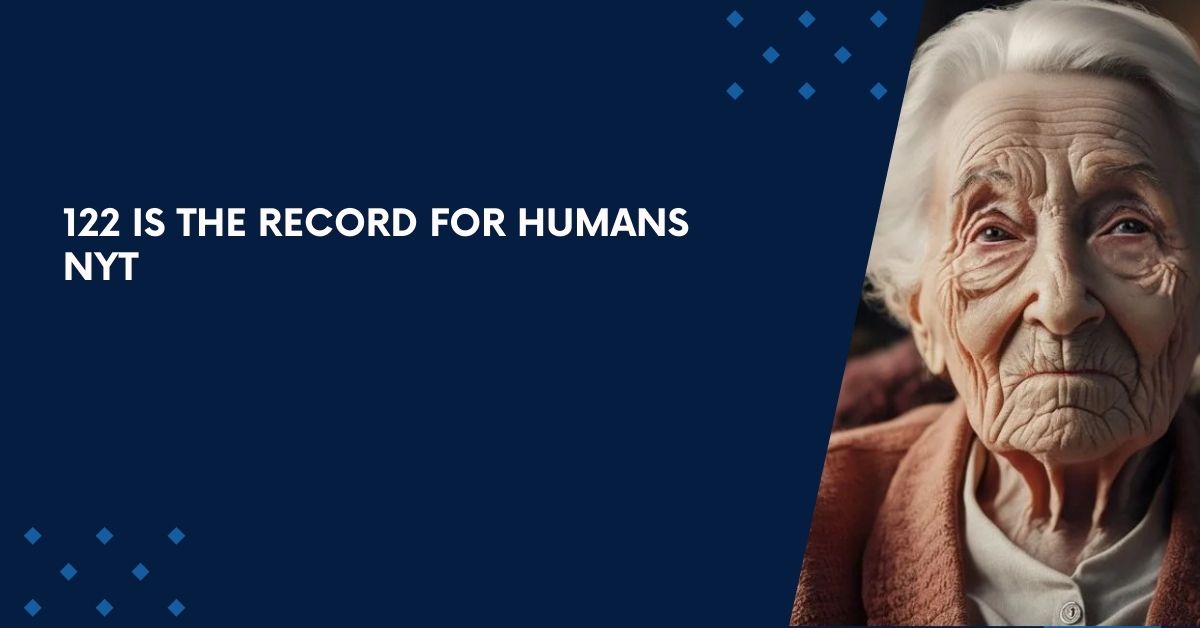122 is the record for humans NYT – Record That Stuns Scientists!
“Reading about Jeanne Calment’s 122-year lifespan in the NYT was eye-opening for me. Her incredible longevity made me rethink my own approach to health and aging. It’s inspiring to see how one person’s extraordinary life can influence and motivate others to pursue a longer, healthier life.”
The New York Times highlights Jeanne Calment as the record-holder for the longest human lifespan at 122 years. Her remarkable longevity, verified through extensive documentation, showcases the potential of human lifespan and captures global fascination.
Stay tuned as we talk about the amazing record of 122 years set by Jeanne Calment, featured by The New York Times. We’ll share what made her life so special and why this age is so remarkable.
Who holds the record for the longest human lifespan?
The record for the longest human lifespan is held by Jeanne Calment. She lived to be 122 years and 164 days old, making her the oldest person ever verified. Jeanne Calment was born on February 21, 1875, in Arles, France, and she passed away on August 4, 1997.
Jeanne Calment’s extraordinary age was confirmed through extensive research and documentation.
Her records included birth certificates, baptismal documents, and other official papers, all of which helped to verify her impressive longevity. This thorough process makes her record widely accepted and respected.
Her remarkable lifespan has fascinated many people around the world. Jeanne Calment’s long life is often studied to understand the factors that contribute to extreme longevity, including genetics, lifestyle, and environment.
Are there any other notable centenarians mentioned about this record?
Sarah Knauss:
She lived to be 119 years and 97 days old, making her the second-longest-lived person on record. Born on September 24, 1880, in the United States, Sarah Knauss was known for her calm demeanor and strong family bonds.
Jiroemon Kimura:
A Japanese supercentenarian who lived to 116 years and 54 days. Born on April 19, 1897, Jiroemon Kimura holds the record for the longest-lived man. His longevity was attributed to a healthy diet and a positive attitude.
Nabi Tajima:
Another Japanese centenarian, she lived to be 117 years and 260 days old. Born on August 4, 1900, Nabi Tajima was known for her vibrant personality and active lifestyle.
She enjoyed a life filled with family and community activities, remaining remarkably engaged and energetic well into her later years..
What does “122 is the record for humans nyt” refer to?
The phrase “122 is the record for humans nyt” refers to the record for the longest verified human lifespan. This record is held by Jeanne Calment, who lived to be 122 years and 164 days old. Her remarkable age has been widely reported and verified, including by The New York Times.
Jeanne Calment was a French woman born on February 21, 1875, and she passed away on August 4, 1997. Her longevity is the longest confirmed lifespan for any human, making her a significant figure in studies of aging.
This record highlights the extreme rarity of reaching such an advanced age and sparks interest in understanding the factors that contribute to extraordinary longevity.
Have there been attempts to verify other claims of extreme longevity?
Yes, there have been many attempts to verify other claims of extreme longevity. Researchers and organizations frequently review documents and conduct investigations to confirm whether claims of extraordinary age are accurate.
This process involves checking birth certificates, official records, and other historical documents to ensure the validity of the claims.
Despite these efforts, most extreme longevity claims have not been verified as thoroughly as Jeanne Calment’s record. Many claims are based on unofficial or incomplete documentation, which can make it challenging to confirm the ages of individuals with certainty.
Overall, while numerous claims exist, Jeanne Calment’s record remains the most widely accepted and verified due to the extensive evidence supporting her age.
What advancements in science are aiming to extend human lifespan?
- Genetic Research:
- Scientists are studying genes linked to longevity to understand how they work and how they might be used to help people live longer.
- Stem Cell Therapy:
- This involves using stem cells to repair or replace damaged tissues in the body, potentially improving health and extending life.
- Anti-Aging Drugs:
- Researchers are developing drugs that target the biological processes of aging, aiming to slow down or even reverse some aspects of aging.
- Improved Healthcare:
- Advances in medical technology, like better diagnostics and treatments, help prevent and manage diseases that can shorten life.
- Healthy Lifestyle Interventions:
- Scientists are exploring how lifestyle factors, such as diet and exercise, can be optimized to increase lifespan and improve overall health.
- Regenerative Medicine:
- This field focuses on regenerating damaged tissues and organs, which could help people stay healthier and live longer.
What are Blue Zones and how are they related to longevity?
Blue Zones are regions around the world where people live significantly longer and healthier lives than the average. The term was coined by Dan Buettner, who studied these areas to find common factors contributing to their residents’ longevity.
In these Blue Zones, people often follow similar lifestyles, including a balanced diet, regular physical activity, strong social connections, and a sense of purpose. These habits help them live longer and reduce the risk of chronic diseases.
Some well-known Blue Zones include Okinawa in Japan, Sardinia in Italy, and Loma Linda in California. The study of these areas provides valuable insights into how lifestyle choices and environments can positively impact lifespan.
How can understanding Jeanne Calment’s life help us?
- Healthy Lifestyle: Jeanne lived a long life with habits like a balanced diet, regular exercise, and avoiding harmful habits. This shows the importance of a healthy lifestyle.
- Genetics: Her family history shows that genetics play a role in longevity. Learning about her family can help us understand the genetic factors that contribute to a long life.
- Positive Attitude: Jeanne had a positive outlook and stayed mentally active. This highlights how a good attitude and mental engagement can support a longer life.
- Social Connections: She maintained strong social ties, which is important for well-being. This teaches us the value of having close relationships and staying socially active.
- Adaptability: Jeanne adapted to many changes over her 122 years. Her ability to embrace change can inspire us to stay flexible and open to new experiences.
- Moderation: Her diet included moderate amounts of wine and chocolate. This suggests that moderation, rather than strict deprivation, can be part of a healthy lifestyle.
How does Jeanne Calment’s age benefit the field of genetics?
Understanding Longevity Genes:
Jeanne Calment’s long life helps scientists identify specific genes that may contribute to longer lifespans. Researchers study her genetic makeup to find out which genes are linked to aging well. Her case offers valuable insights into the biology of aging and could lead to discoveries that help improve longevity for others.
Studying Family History:
By looking at Jeanne’s family, scientists can see if her long life runs in her family. This helps them understand if there are inherited factors that help people live longer. Observing these patterns can reveal whether longevity is influenced by genetics and guide research into age-related health improvements.
Identifying Healthy Aging Traits:
Calment’s case helps scientists find out what genetic traits are associated with staying healthy as we age, like better immunity or slower aging processes. Understanding these traits could lead to new ways to promote healthy aging and improve quality of life in older adults.
Comparing with Others:
Researchers compare Jeanne’s genes with those of other long-lived people to spot common genetic features. This can reveal important information about what helps people live longer. Identifying these shared traits may lead to new strategies for extending healthy lifespan and preventing age-related diseases.
Can Calment’s record influence public health policies?
Her remarkable longevity can inspire health authorities to promote lifestyle changes that might help people live longer. For instance, policies encouraging healthy eating, regular exercise, and strong social connections could be emphasized.
Calment’s long life highlights the importance of researching aging and longevity. Governments and organizations might increase funding for studies on how to extend healthy lifespans and improve the quality of life for older adults.
Her case can help shape guidelines on how to age healthily. Public health policies might include recommendations based on her lifestyle and habits, aiming to improve overall public health and longevity.
FAQs:
1. What makes Jeanne Calment’s longevity unique?
Jeanne Calment’s longevity is unique due to her reaching 122 years and 164 days, which is the longest verified human lifespan. Her case provides valuable insights into extreme longevity and has been rigorously documented and verified through various records.
2. What role do genetics play in Jeanne Calment’s longevity?
Genetics likely played a significant role in Jeanne Calment’s longevity. Studies show that people who live exceptionally long lives often have specific genetic markers, and her family history supports this notion, as her parents also lived long lives.
3. How does Jeanne Calment’s record impact public health policies?
Her record can inspire public health initiatives focused on promoting healthy lifestyles and aging. Policies might be developed to encourage practices that could help people live longer, healthier lives based on what contributed to her longevity.
4. How does studying Jeanne Calment’s life help in developing anti-aging treatments?
Studying her life helps researchers identify patterns and factors that contribute to extreme longevity. This information can inform the development of anti-aging treatments and strategies aimed at extending human life and improving health in old age.
5. What can individuals learn from Jeanne Calment’s lifestyle and habits?
Individuals can learn the importance of maintaining an active lifestyle, having a positive outlook, and making healthy dietary choices. Her life illustrates that these habits, combined with good genetics, can contribute to a longer and healthier life.
Conclusion:
Jeanne Calment’s record of living 122 years shows us what’s possible with a long life. Her story helps us understand how factors like genetics, a healthy lifestyle, and staying social can contribute to living longer. Learning from her life gives us useful tips for improving our own health and longevity.
As we search for ways to extend life even further, Jeanne Calment’s example reminds us of the potential for a long and fulfilling life.
Read more:






